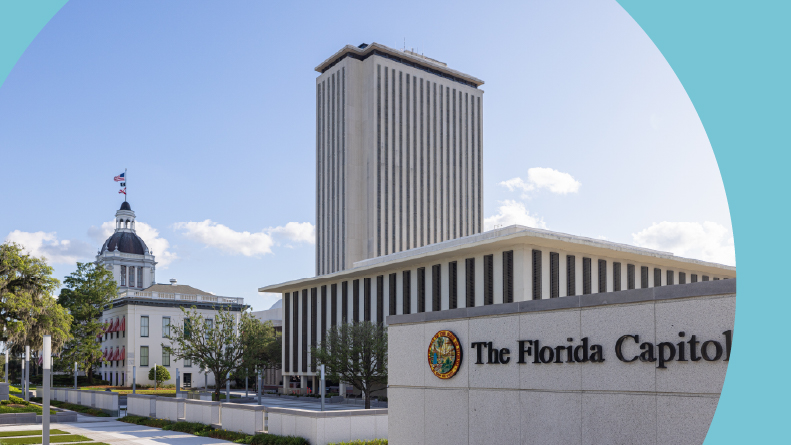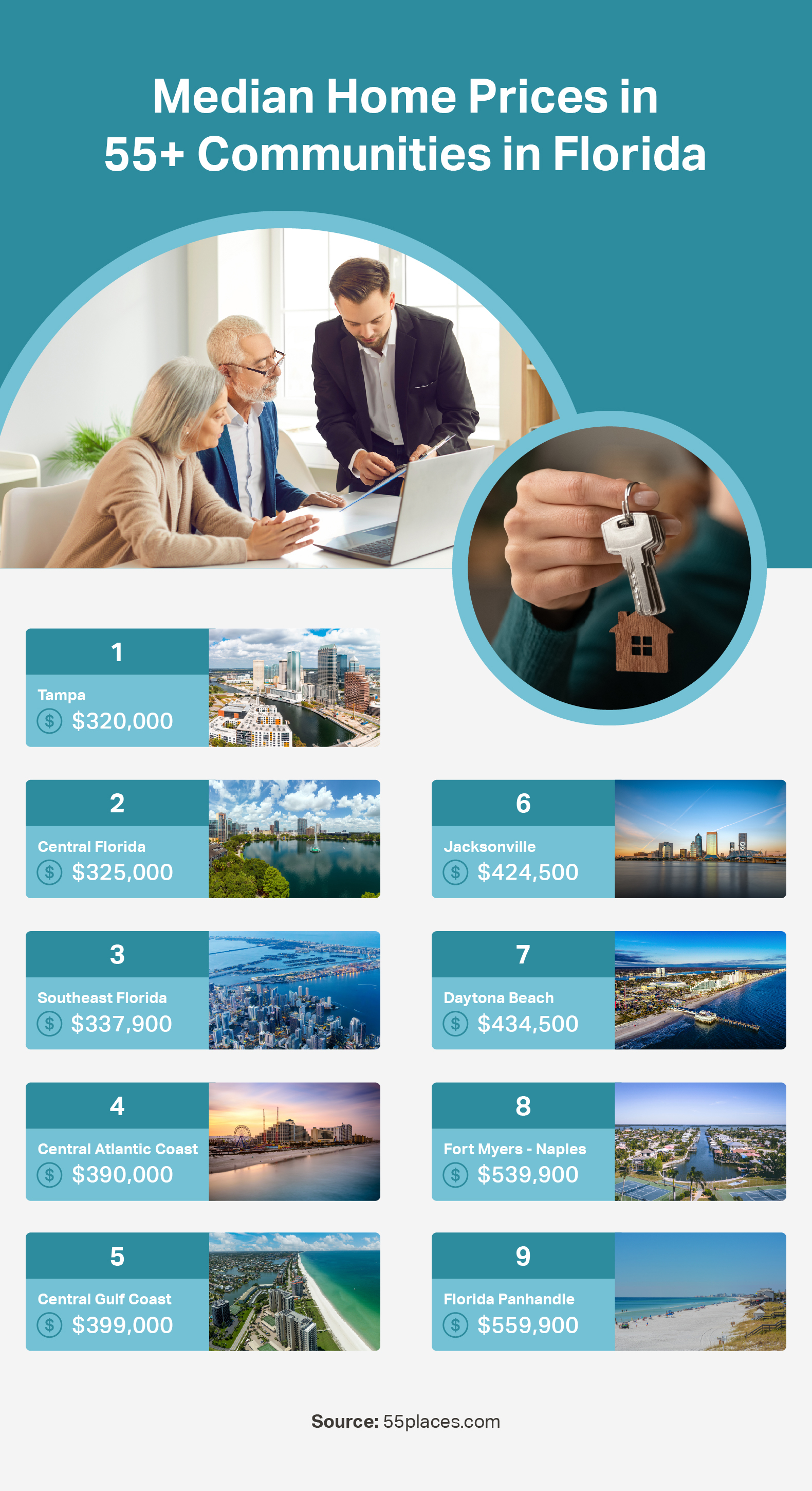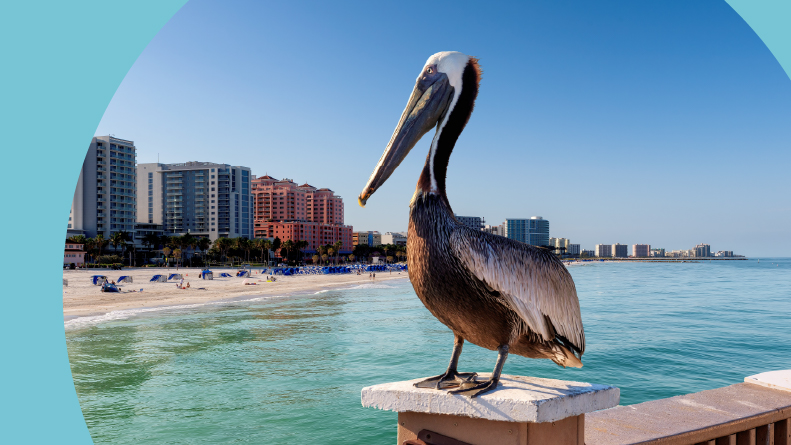Florida has long been one of the most popular retirement destinations in the country, and it’s easy to see why. With year-round sunshine, miles of coastline, and a reputation for being tax-friendly, the state continues to attract retirees from all over. While many know that Florida has no state income tax, understanding Florida taxes for retirees means looking at the bigger picture. Housing costs, insurance rates, and the overall cost of living can vary quite a bit depending on where you settle.
Here’s what you need to know to get a full financial picture before making the move.
Florida Retirement Taxes

No State Income Tax
As mentioned earlier, Florida’s lack of income tax is well-known, making it a popular retirement choice. Pensions, Social Security benefits, 401(k) payouts, and other forms of retirement income are all tax-free at the state level in Florida.
Estate and Inheritance Taxes
Florida also doesn’t have an estate or inheritance tax. This is a significant benefit for retirees who want to pass on wealth to their heirs. The recipient of the inheritance will only need to pay applicable federal estate taxes, which only affect very large estates.
Property Taxes
Although there’s no income tax, Florida residents still need to deal with property taxes. The statewide average property tax rate is around $1,700 annually, or 0.97% of the home’s value. It should be noted that rates vary from county to county. More populous areas such as Miami-Dade, Palm Beach, and Broward have higher property taxes than more rural counties.
Sales Tax
Sales tax in Florida can come in two forms. The state itself has a sales tax of 6%, and each county can add its own surtax. Depending on where you choose to settle, the total sales tax can range from 6% to 7.5% or so. Groceries and prescription drugs are exempt, which can help reduce costs.
Gas Tax
So far, Florida has been around the national average or better. That’s not the case with the gas tax in the state, which is slightly above the national average. Drivers can expect to spend $0.394 per gallon of gas.
Florida’s Cost of Living

Taxes are only one part of the affordability equation. The overall cost of living in the state is slightly above the national average at around $2,500 per month for singles and $5,700 for families of four. Like some of the taxes, your cost of living will vary significantly depending on where you choose to retire.
Housing Costs
Housing is often the largest expense for retirees. Florida’s median home price is a little over $380,000, though there’s significant variability between coastal vs inland areas:
- Affordable regions: Inland locales like Ocala, Gainesville, and Lakeland typically have lower housing costs than the rest of the state.
- Moderate regions: Cities such as Tampa, Orlando, and Jacksonville offer a balance of affordability and amenities, with housing costs comparable to the state average.
- Expensive regions: Areas with beaches, such as South Florida and parts of Southwest Florida, are among the areas with the highest cost of living.
In Florida’s 55+ communities, homes tend to stay on the market for about 260 days on average. The typical listing price is in the low $400ks, according to data from 55places.com, but that can vary a lot depending on the community’s size, location, and amenities. For instance, homes in Sabal Ridge average close to $2.4 million, while in Stonecrest, the average is in the mid $300ks.

Utilities and Energy
The energy rates in Florida are generally in line with the national average at $0.17 per kilowatt/hour. However, this only tells part of the story. Florida’s climate is much warmer than that of northern states, requiring year-round air conditioning in many parts of the state. Summer months in particular require a lot of energy. This results in an average monthly electricity bill of around $291, slightly higher than the national average.
Insurance Costs
Insurance costs are another area where Florida isn’t as friendly as other parts of the country. The frequency of hurricanes and floods makes insurance premiums significantly higher in Florida, with costs averaging just under $8,800. This is nearly four times the national average. To aid homeowners who are facing high insurance costs, Citizens Property Insurance Corporation was formed. This non-profit offers low-cost insurance to those who qualify.
Healthcare Costs
Retirees often have more health care concerns than younger residents. Thankfully, Florida has a robust health care system. There are plenty of hospitals, clinics, and retirement-focused medical centers for transplants in the area. In most areas, costs are close to the national average, at $9,865 annually, although some more expensive areas have slightly higher-than-average medical costs.
Everyday Living Costs
- Transportation: Gas prices are moderate, though heavy traffic in the more populated areas can burn through fuel.
- Entertainment: Florida offers a wealth of affordable entertainment options, though resort towns can be pricey.
- Groceries: Close to national averages, though slightly higher in coastal and tourist-heavy areas.
Regional Differences in Cost of Living

Florida is a diverse state with the cost of living varying quite a bit from one region to the next. Understanding the dynamics of the various regions will help you make an informed decision about where to retire.
North Florida
Northern Florida includes areas such as Tallahassee, Pensacola, and Jacksonville. This region is generally more affordable than the rest of the state, with a lower cost of living and moderate property tax rates. The northern location results in a slightly cooler climate, and the pace of life is more relaxed than in South Florida.
Central Florida
Central Florida cities, such as Orlando and Tampa, are popular retirement destinations. They offer strong access to health care and an abundant array of activities to keep retirees entertained. Costs here are moderate—higher than in North Florida but lower than in South Florida. The tourist areas of Orlando can be a bit higher, but suburban communities are generally affordable.
Inland Florida doesn’t offer a lot in terms of nightlife or cultural attractions in comparison to the vibrant coastal regions. The region comprises smaller cities such as Ocala, Lakeland, and Sebring. Their smaller, less exciting vibe is beneficial to those seeking a quieter place to retire. The more laid-back environment also comes with the benefit of having some of the lowest costs of living in the state.
South Florida
South Florida brings beaches and vibrant cultural scenes. These top-choice destinations come with a premium price tag, with high housing and insurance costs. For retirees who can afford it, South Florida cities like Miami, Fort Lauderdale, and West Palm Beach are an attractive choice for their amenities and cosmopolitan feel.
Southwest Florida
Like South Florida, Southwest Florida is a retirement hot spot with sunny weather and gorgeous beaches. Also, like South Florida, cities in this region tend to be more expensive. Top destinations in Southwest Florida include Naples, Sarasota, and Fort Myers. Naples, in particular, consistently ranks among the most expensive places in the state. Its exclusive, luxurious feel makes it one of the most popular choices for wealthy retirees.
Discover the Perfect Florida Home for Your Lifestyle and Budget
Ready to find a home in Florida that fits both your lifestyle and your budget? At 55places.com, we make it easy to connect with experienced local real estate agents who understand the unique needs of active adults. Whether you’re looking for an affordable retreat, a community packed with amenities, or something in between, our trusted partners can guide you every step of the way. Reach out today and let us help you discover the perfect Florida home within your budget.
Florida Taxes FAQ
1. Does Florida have a state income tax?
No. Florida does not have a state income tax, which means Social Security, pensions, and retirement account withdrawals are all tax-free at the state level.
2. Are Social Security benefits taxed in Florida?
No. Florida does not tax Social Security benefits, making it attractive for retirees who depend on this income.
3. Do retirees in Florida pay tax on pensions or 401(k) withdrawals?
No. Pensions, IRAs, and 401(k) withdrawals are not subject to state income tax in Florida.
4. Does Florida have an estate or inheritance tax?
No. Florida does not impose estate or inheritance taxes. Only federal estate taxes may apply to very large estates.
5. What is the average property tax rate in Florida?
The average property tax rate is about 0.97% of a home’s value, but it varies by county.
6. Are groceries taxed in Florida?
No. Most groceries, prescription drugs, and medical supplies are exempt from sales tax.
7. Are retirement communities in Florida subject to special taxes?
No special taxes apply specifically to retirement communities, but homeowners must pay standard property taxes and fees associated with their community.
8. Do snowbirds (part-time residents) have to pay Florida taxes?
No. Florida has no income tax, but part-time residents must pay property taxes if they own a home in the state.
9. What is the Homestead Exemption in Florida?
The Homestead Exemption reduces the taxable value of a primary residence by up to $50,000, lowering property tax bills for homeowners.
10 Are there any hidden taxes retirees should know about in Florida?
Florida has no income tax, estate tax, or inheritance tax. However, retirees should budget for higher insurance premiums, property taxes that vary by county, and local surtaxes on sales.









